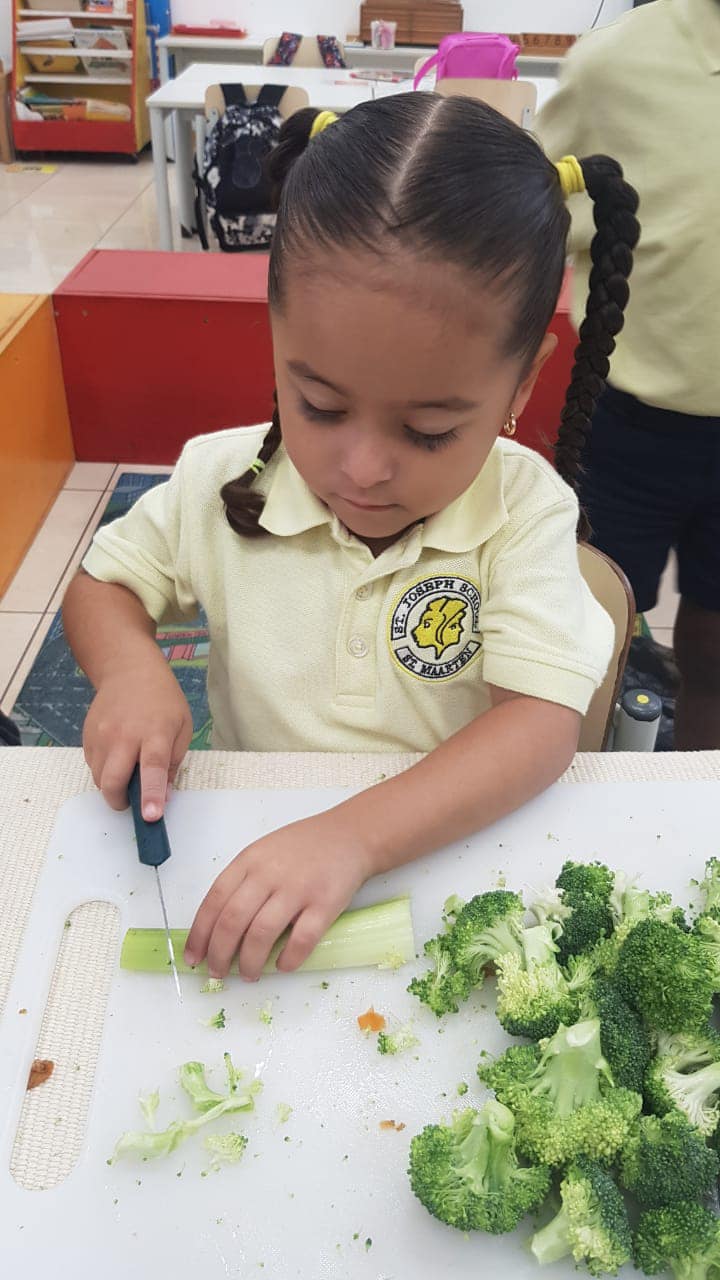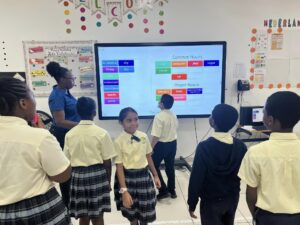Part 3: Gen Z, Gen Alpha, and future directions in education
Looking to the future, Foundation Catholic Education St. Maarten envisions an evolving educational landscape that meets the needs of Gen Z and future generations. Teachers will increasingly assume roles as coaches, guiding students in collaborative learning with their peers. School days may shorten, with more learning occurring remotely, allowing students to study at their own pace while receiving guidance from teacher-coaches.
Artificial Intelligence (AI) will play a significant role in education. While it may initially seem disruptive, AI offers opportunities to enhance learning. We plan to guide our students in using AI responsibly and effectively, preparing them for a world where AI is integral to daily life.
The school manager at Sr. Regina School shares that her long-term goal is to continue evolving as a portfolio school, focusing on personalized learning and coaching. The aim is to create and sustain a ‘Learning Community’ that supports continuous growth and development for both students and educators.
“In our approach to personalized learning, we ensure that every student, regardless of ability or interest, receives the attention they need. Individualized support helps students who struggle or excel, ensuring they thrive. Inclusivity and equity are central to our educational philosophy. Our school has implemented Individual Education (IE) programs that cater to students with special needs, ensuring they are fully involved in daily operations and activities. This fosters a sense of belonging and allows them to engage meaningfully with their peers.”
Impact of educational technology on student engagement
The adoption of new educational technologies has profoundly impacted student engagement and learning outcomes. These technologies increase student engagement by providing immediate feedback and self-correction opportunities, fostering a sense of achievement and sustained motivation.
Balancing academic rigor with the well-being and mental health of Gen Z students is another critical focus. We have shifted towards learner-driven activities that promote higher-order thinking. By encouraging students to take the lead in their learning—whether through presentations, creative assignments, or project-based tasks—we ensure they remain actively involved. This approach supports their emotional and mental well-being by reducing stress and increasing their sense of control over their learning journey.
Samantha Beaton, the school manager of Sr. Regina School, shares a success story about the school’s collaborative approach to supporting high-risk and special needs students. One student in the IE program successfully reintegrated into a regular classroom setting, thanks to effective communication and collaboration between teachers and external agencies. This success highlights the importance of teamwork and consistent communication in helping every student thrive.
Effective strategies for educating Gen Z
Educating Gen Z students comes with challenges related to their constant connectivity and preference for digital interaction. To address these challenges, schools have implemented several effective strategies:
Interactive technology: Utilizing smart boards, educational apps, and gamification to create engaging learning experiences.
Flipped classroom model: Allowing students to learn content at their own pace outside of class, freeing classroom time for deeper, hands-on exploration.
Clear device usage policies: Establishing rules for device usage to minimize distractions while leveraging technology for learning.
Teachers have also participated in workshops and mastermind sessions to better understand and adapt to Gen Z students’ needs. The introduction of Bring Your Own Device (BYOD) policies and blended learning models has made education more accessible and relevant.
Looking ahead, schools are committed to evolving with the needs of Gen Z and future generations. They envision a future where teachers increasingly take on coaching roles, guiding students as they collaborate and learn from each other’s strengths. Shorter school days, more remote learning opportunities, and AI integration will likely shape the educational landscape. Our goal is to guide students through these changes, ensuring they develop the skills needed to navigate an AI-driven world responsibly.
Future directions in education
The school managers of St. Joseph, St. Dominic, and other schools believe the future of education will evolve significantly to meet the needs of Gen Z and future generations, driven by advancements in technology and evolving educational practices. They envision several key trends:
Personalized Learning:
AI and Adaptive Learning: AI will create adaptive learning environments that cater to individual strengths, weaknesses, and learning styles.
Data-Driven Instruction: Enhanced data analytics will allow real-time tracking of student progress, enabling precise and timely interventions.
Blended and Flexible Learning Models:
Hybrid Learning: A combination of in-person and online instruction will become more prevalent, offering flexibility and catering to diverse learning preferences.
Asynchronous Learning: Students will have the opportunity to learn at their own pace through asynchronous courses, providing greater control over their educational experience.
Technological Integration: Virtual and Augmented Reality: VR and AR will create immersive learning experiences, making abstract concepts more tangible and engaging.
Gamification: Gamified learning platforms will motivate students through rewards and challenges.
Schools are committed to continue to focus on future skills with the continued implementation of:
STEM and Beyond: Emphasis on STEM will continue, with broader inclusion of STEAM (adding Arts) to foster creativity alongside technical skills.
Soft Skills: Greater focus on developing essential soft skills such as communication, critical thinking, collaboration, and emotional intelligence, preparing students for a dynamic workforce.
The commitment of the Foundation Catholic Schools St. Maarten is to continually adapt and improve educational approaches by:
- Utilizing adaptive learning technologies and data analytics.
- Developing individualized education plans (IEPs) and personalized learning paths.
- Training teachers in differentiated instruction strategies.
- Maintaining up-to-date classroom technology.
- Incorporating emerging technologies like AI, VR, and AR into the curriculum.
- Providing ongoing professional development for teachers in tech integration.
- Fostering critical thinking, creativity, collaboration, and communication skills.
- Partnering with businesses and organizations to offer real-world learning experiences.
To achieve the goal of personalized and inclusive education, they collaborate with parents, teachers, and specialists to create IEPs, regularly assess student progress, and provide ongoing training for educators on inclusive teaching practices.
School managers emphasize that ensuring inclusivity and equity means integrating students with special needs into day-to-day activities, encouraging them to showcase their talents and participate fully in school life. Promoting a culture of inclusion ensures that no student is excluded or disengaged, creating an environment where all students feel valued and supported.



